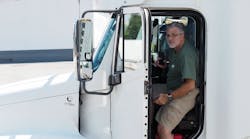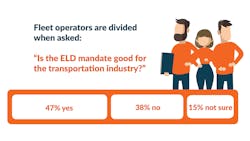While the Federal Motor Carrier Safety Administration (FMCSA) has been reporting nearly universal compliance with electronic logging devices, or ELDs, a new study from an ELD and fleet management systems provider shows it's not all hearts and flowers in terms of fleets' opinions of and faith in the devices to accomplish their intended goal—not nearly.
Less than half of fleet operators, 47%, who responded to the survey from Coretex, think the ELD mandate is good for the transportation industry. Somewhat in contrast to that belief, however, is that just over half of respondents (51%) said ELDs will improve their fleet's Compliance, Safety, Accountability (CSA) score maintained by FMCSA.
The rest of those results and their flipsides are quite telling. Almost four out of 10 fleet operators (38%) don't—do not—think ELDs are good for the transportation industry; another 15% are still on the fence. And just about half of the responding fleets said ELDs won't improve their CSA scores.
CSA scores include fleets' crash/ collision data and are related to safety records, so the survey results could be a reflection that fleets are doubtful ELDs will actually improve safety—which is, after all, the whole point of the federal Hours of Service (HOS) rules that the devices ultimately enforce.
Getting better?
There's an important footnote in that regard. This year, Fleet Owner has heard concerns from hundreds of truck drivers and fleets that ELDs will make the roads less safe, since they'll hold drivers unequivocally to on-duty hours and other limitations of the HOS rules. With the delays and unexpected problems that can occur in trucking from freight pickup to delivery, the common complaint was that the HOS limits were forcing drivers to "race against the clock" to complete a job and get to safe parking.
FMCSA's recent clarification of personal conveyance, however, may go a long way to alleviating some of those particular concerns going forward. Although a carrier first must choose whether to allow personal conveyance at all, that off-duty driving status allows a driver to operate a commercial motor vehicle outside of the HOS drive time limits in certain situations—including getting to the nearest safe parking location for required off-duty time.
Coretex conducted its ELD survey from April 15, two weeks after full enforcement of ELDs began, through June 15 and got responses from 303 U.S. trucking companies "of various sizes."
Other thoughts and concerns
Another telling result from the survey is that a majority of fleets report that, essentially, drivers don't like ELDs, and some say the devices are hurting retention, which is already a big problem in trucking.
And perhaps not surprisingly considering the sometimes small production scale of these truck connectivity devices, some fleets are finding their ELDs glitchy.
Some specific findings from the survey include:
—More than two-thirds, 69%, of responding companies said ELDs do not improve driver satisfaction.
—One out of three, 33%, respondents said it's more difficult to retain drivers due to strict HOS compliance.
—The problems fleets cited most concerning their ELDs were inaccurate data, connectivity issues, and poor technical support. Even so, 82% said they are satisfied with their ELD provider and rated their technical support an average of 3.73 out of 5.
—Forgetting HOS for a minute, fleets do see the potential to gain from connectivity in trucks. The ELD features fleets ranked most highly in the survey are real-time tracking, ease of use, and reporting capabilities.
Craig Morris, executive vice president of mixed fleets at Coretex, surmised that the survey results show that many fleets, especially smaller ones, view ELDs "as a burden." But he suggested a focus on business improvement, urging ELD providers to educate the industry on how truck data access can be used for fuel efficiency and productivity gains.
There's been no shortage of derision and push-back to ELDs as the mandate to use them approached and has gone into full enforcement; some fleets and drivers, on the other hand, have been consistently supportive. What do you think: are ELDs working as intended, and is trucking better because of them?




